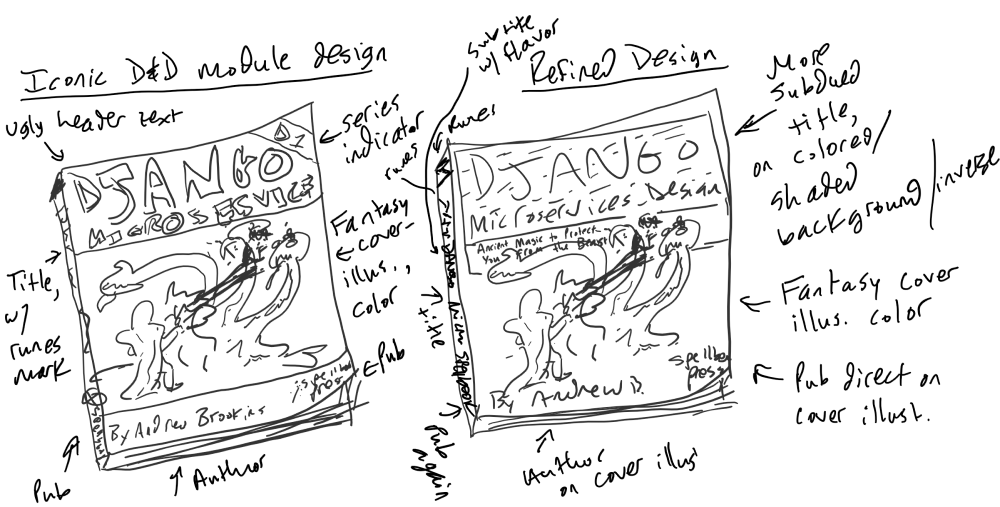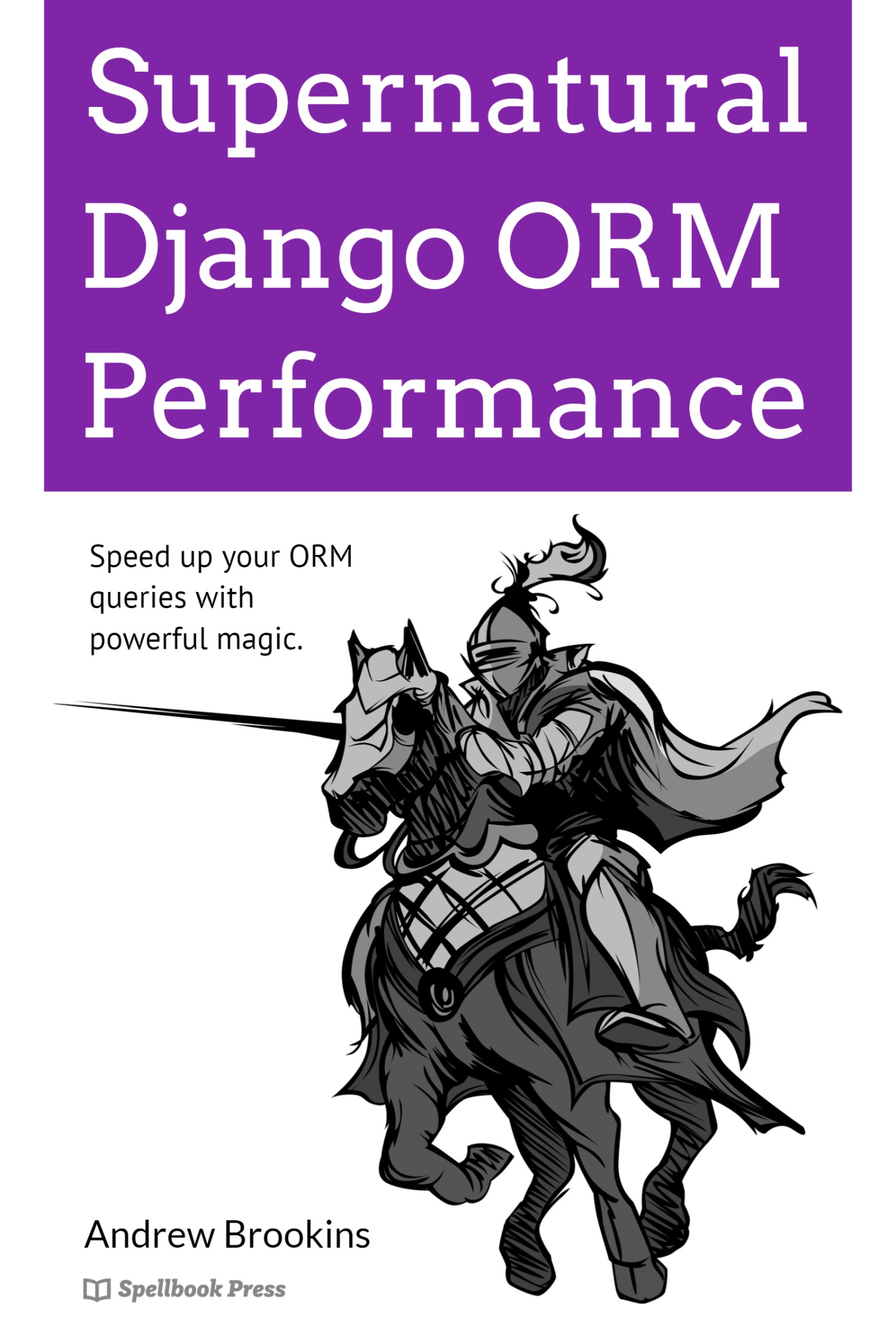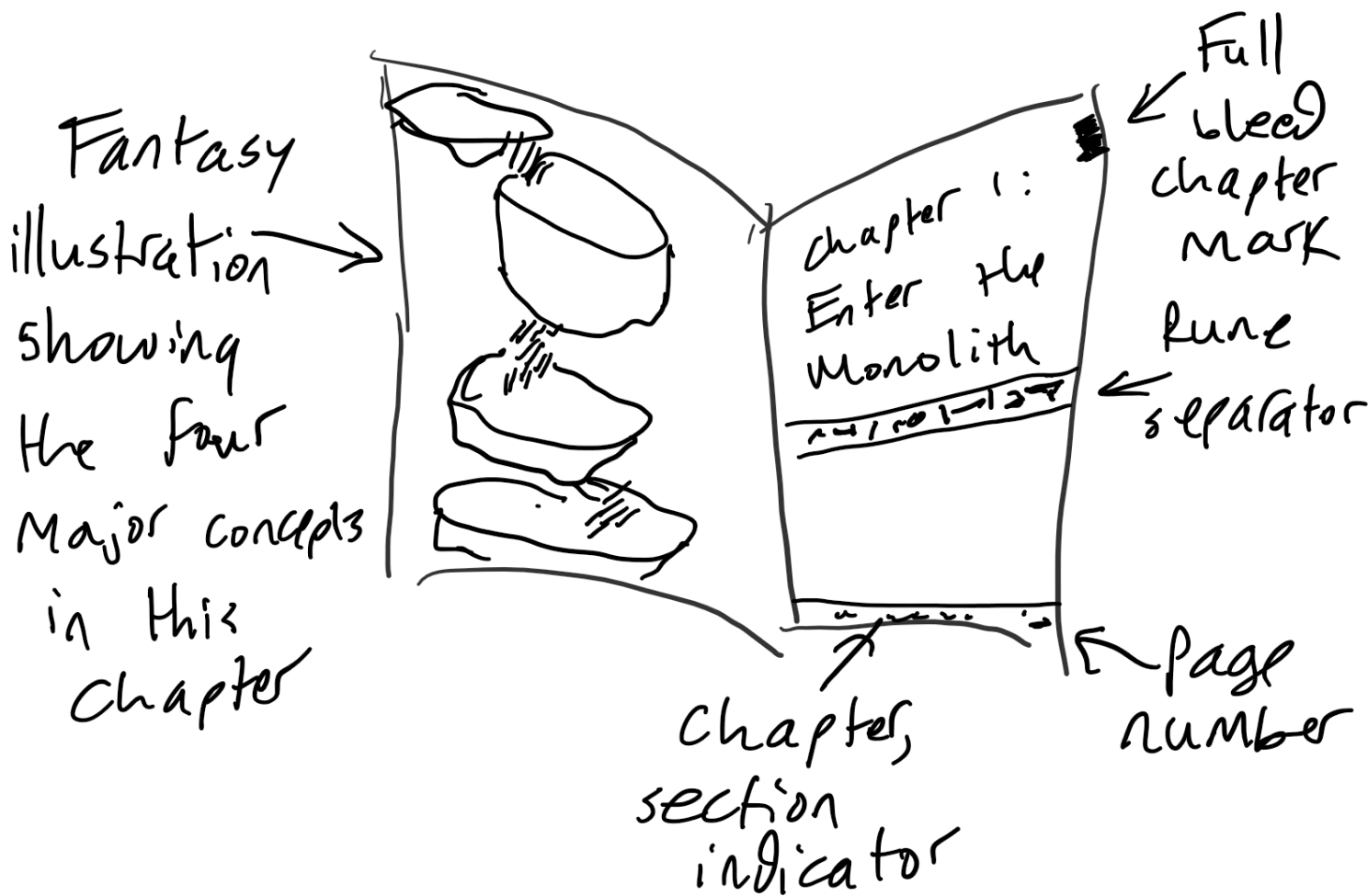I started a publishing company! Spellbook Press launched this week, taking preorders for our first book, Supernatural Django ORM Performance. Check it out!
The Idea
I’ve wanted to run a publishing company for years. I’ve also known for a long time that I want to publish short, focused technical books on niche topics.
However, it was only last fall that I felt strongly enough about the theme of the company to start working. The concept I decided on was focused books between 30 and 100 pages on technical topics with a fantasy theme.
For examples of well-done technical titles within this page range, see “The Log” by Jay Kreps or Jesse Storimer’s books.
Aside from the length, I wanted every book to follow certain rules inspired by D&D adventures. For example:
- The cover would feature a full-color fantasy illustration
- The experience level would be explicit (“For adventurers level 1-3”)
- The interior would contain fantasy art and maps of technical concepts
Cover Design
I first envisioned publishing stapled-together books with a design similar to the iconic 1st Edition Dungeons & Dragons modules from the 80s. If you haven’t seen these books, they look like this:
As I doodled cover mockups, I became less certain that technical books using a D&D-inspired cover would appeal to readers. Instead, I tried to combine fantasy art with enough whitespace that the cover would fit in on a bookshelf with the likes of O’Reilly and Pragmatic Programmers. That way, if I could get a print version of the book on the shelf at my favorite local book store, Powell’s Books, someone might buy it.

In my “refined” version of the cover design, there is a meaningful color (probably for series identification), a fantasy illustration, and runes on some combination of the front, back, and spine.
Now I just need is a designer – but I can’t afford paying someone yet.
To help with this, I decided to publish two books in 2019 instead of one, so that I could use the first book to bootstrap better design for the second. The first book would be a shorter title on performance-tuning the Django ORM that I would give myself permission to botch design on. The second would be a longer book on building microservices with Django, with better design.
The image I hacked together for Supernatural Django ORM Performance with the Shutterstock editor and a piece of stock art looks like this:

This isn’t a cover that I want to publish, but I’d like to see if it’s good enough to sell preorders.
I’m still torn between having a “weird” design that stands out and a normal-ish cover with a fantasy illustration. But at least now I can run an experiment: will anyone preorder?
Interior Design
So, the exterior will feature a fantasy illustration. But what about the interior? Here is my mockup:

The most important element of the interior design of a Spellbook Press book is the map. Every book will have a fantasy-themed map of the concepts in the book, and every chapter will have a map of the concepts in the chapter. For an example of this, see the book Designing Data-Intensive Applications, by Martin Kleppmann.
The other distinctive element of the interior design is that the books will be scattered with fantasy illustrations and bits of themed text. For example, a blurb might appear in a sidebar or chapter introduction from a powerful wizard who expresses his disdain for vile unbounded queries.
Learning Features
Aside from the text itself, I intend to build additional learning features into each book.
-
Every book will offer an audio version at a higher price tier, and if video ends up being a popular request, then I will develop the same content from the book as a series of 3-5 minute videos.
-
Every chapter will include a quiz in the text
The example application featured in both Django books I’m writing this year is a learning web app called Spellbook Quest that I plan to tie into the books. So, in the future, you could use Quest to keep track of your learning goals, add non-Spellbook content to a goal like “Learn Django Models,” and complete quizzes from your Django Spellbooks interactively.
Press Ethics
I think about ethics almost as much as I think about books and technology, and Spellbook Press will reflect this thinking.
Just as I believe that every software developer serves the common good first, businesses must do the same. To serve the common good with Spellbook Press, I am committed to:
- Seeking B Corporation certification in 2020
- Using 100% renewable power in all business operations
- Using technology and products that have the least harmful impact on the environment
- Developing fair contracts with writers based on guidance from the Author’s Guild
- Buying from Portland, Oregon, and United States businesses as often as is possible
- Employing workers at fair market rates
- Seeking out diverse authors, artists, and designers to work with
- Releasing an annual Social Responsibility report with details on all these commitments
Experience Report: Month 1
What is it like to start a publishing company? I can tell you about my first month in business. Here is what I accomplished in January:
- Chose two topics for 2019: Django ORM performance and Django microservice design
- Put in about 40 hours of development work on code samples
- Told at least 10 people personally that I was starting a publishing company
- Reached out to publishing industry and artist acquaintances in my neighborhood to network
- Picked a name – “Spellbound Press,” which I had to revise to “Spellbook Press” because there was already a Spellbound River Press
- Read half of Joe Biel’s A People’s Guide to Publishing – highly recommended
- Registered my business with Oregon State
- Designed a simple logo with Logojoy
- Registered spellbookpress.com and signed up for @SpellbookPress on Twitter
I’m happy that services like Shutterstock and Logojoy exist. With zero design skills, I can still launch a business. Thanks, internet! By the way, here’s the logo I chose:

What I Want to Publish
Supernatural Django ORM Performance is an example of one type of book I want to publish: short, focused, and technical.
Along these lines, in 2020 I plan to publish at least one more book on the following topics:
- Building microservices with Django
- Deploying Django apps on Kubernetes
- Building microfrontends with Django and React
However, there are a slew of topics I want to publish short books about. In 2020 I’d like to publish topics like the following:
- Creating interactive text adventures with Twine or other tools
- In-depth explanations of a particular algorithm or protocol, like RAFT
- Building applications for IPFS
- Using Neovim, Visual Studio Code, Intellij IDEs, or Emacs
- Writing plugins for Neovim and other editors
- Primers on HIPAA, GDPR, and other regulations for programmers
- Histories of MUDs, BBSes, or IRC
- High-performance REST APIs with Falcon
- Deep explanations of how Docker layers work
- Monitoring Kubernetes-hosted applications in GCP and AWS
- Behind the scenes stories or architecture reviews of open-source projects
- The Gremlin query language and a graph database like Titan
- Adding inventory control to a Unity game
- Serverless web apps with Python and Google Cloud Platform
- Programming on Chromebooks, iPads, or Desktop Linux
- Dungeons and Dragons for programmers, or other “topic you love, but for programmers” books
- Interviews with programmers on a theme (“How did you get started in iOS development?”)
- Path from programmer to manager
Follow Me!
Want to hear more about this? Join my newsletter or follow @SpellbookPress. If you have an idea for a book about one of the subjects I listed, get in touch! My email is “a @ andrewbrookins.com”.



